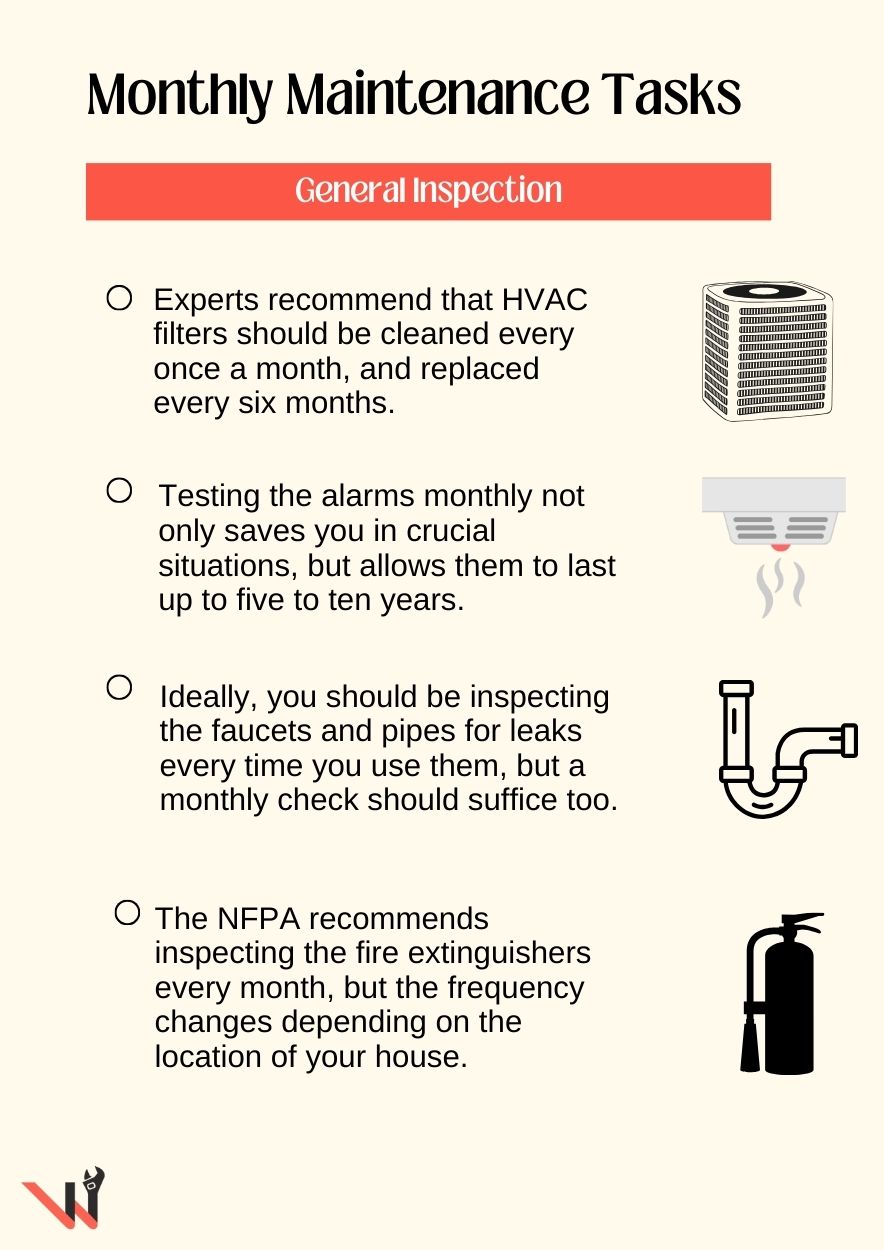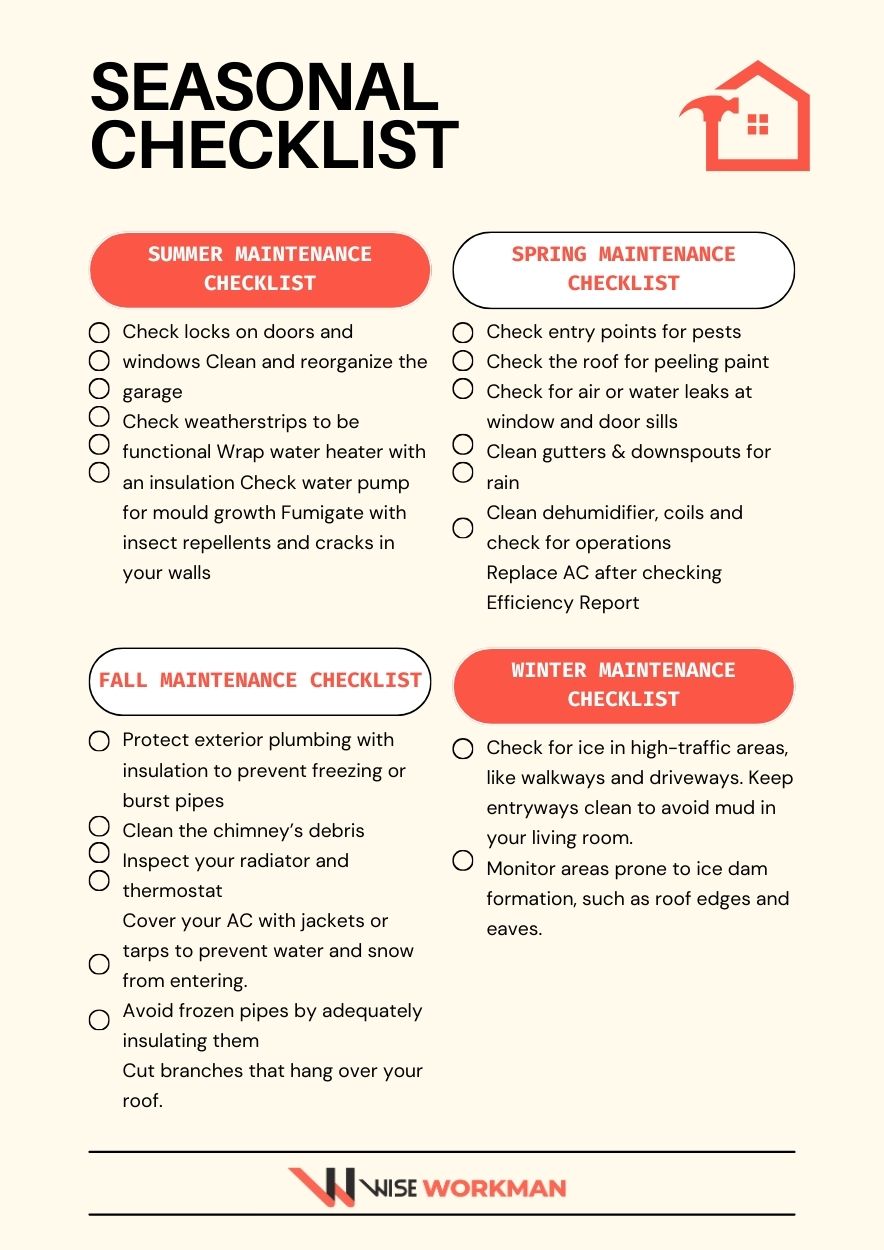Owning your own property brings a sense of calm and reward, however, household upkeep is a job on its own and demands your time in attention to small details.
Think of maintaining your house as a regular health checkup. It is an investment needed at intervals that saves you from spending altogether. This does not include
Property care checklists can be broken down into exterior and interior tasks, which require cleaning and and repairing. You need to pay attention to plumbing, monitor appliance safety and electrical and gas systems.
Some of these tasks may be too complex for your skill level and you may put them off for maintenance. For this reason, we have prepared a home maintenance plan that you can follow easily and quickly.
These checklists can be followed in every season, be it preparing for a tough snowfall or dry summers. You can take up small tasks each month to avoid huge repairs and replacements costs at the end.
Follow the home maintenance schedule and do justice to your property!

The impending doom of maintenance emergencies is best avoided with regular home inspections.
We recommend you maintain a monthly checklist of the upgrades needed and accordingly tabulate your finances to mitigate urgent expenses.
The task of checking all your appliances may seem time consuming. To help you out, we have a list of the necessary equipment you should be monitoring for maintenance.
The heating, ventilation, and air conditioning system of the house keeps the air fresh and free from dust, pollen and pollutants. The layer of buildup gradually decreases the efficiency of the HVAC filter, increases power consumption and costs.
Experts recommend that HVAC filters should be cleaned every once a month, and replaced every six months. This varies depending on the dry or dusty climate and exposure of your house to pet fur.
Although a part of every home kitchen, smoke and carbon monoxide detectors are often overlooked. You do not want one of the most important alarms in your house to not go off in cases of emergencies and cause any harm to your loved ones.
Carbon monoxide is odourless and a silent killer, necessitating preventative maintenance of detectors and fire alarms.
Testing the alarms monthly not only saves you in crucial situations, but allows them to last up to five to ten years.
As home owners, water leaks are the most detrimental to the property and require immediate detection.
Ideally, you should be inspecting the faucets and pipes for leaks every time you use them, but a monthly check should suffice too.
Keep an eye out for unexplained and unnecessary high water bills every month, where sudden spikes indicate water leaks. While puddles around leaking faucets are self-explanatory, you should examine ceiling and walls for discolouration and dampness.
The NFPA recommends inspecting the fire extinguishers every month, but the frequency changes depending on the location of your house. It is safer to do it more often if you live closer to the sea, with higher chances of rusting.
We have a handy checklist that allows you to execute seasonal home care practically. You can follow this to ensure you tick off annual property inspections.
Keep in mind, some checks may need a professional’s experience to evaluate the damage and repair cost.

This is the time of calmness after a reckless winter season. Pay attention to small details and make it a part of your chores list so it does not become a burden.
Peak summers are for you to enjoy the season, and worry less about home repairs. Carry out these most important maintenance tasks for :
If you experience extreme winters, spend your fall preparing and renovating the house to not add on to your last minute worries.
Brace yourself and prepare your home for extreme weather conditions. This list will guide you towards danger signs you should be watching out for to stay ahead of the frost:
If you are a first time buyer devising a maintenance schedule for your property on an annual basis saves you from spending an extravagant amount in emergencies.
As first time property buyers, we often overlook the maintenance and repairs a house demands in order to make it livable.
We have a rounded timeline of yearly home check ups that you should not miss out on.
1. Roof and Gutters:
- Inspect roof for damaged, missing, or loose shingles, curled or buckled shingles.
- Check and clean gutters and downspouts for damage, sagging, or clogs.
2. Exterior:
- Inspect siding for damage, cracks, or rot.
- Check windows and doors for proper sealing and damage.
- Inspect decks and patios for damage, rot, or insect infestation.
3. Plumbing:
- Check for leaks under sinks, toilets, and around water heaters.
- Inspect water heater temperature and pressure relief valve.
4. HVAC:
- Change air filters.
- Inspect and clean condenser coils.
- Schedule professional maintenance for AC and furnace.
1. Pest Control:
- Inspect for signs of pest infestation and seal entry.
2. Landscape:
- Trim trees and shrubs.
- Inspect and repair irrigation systems.
3. Appliances:
- Clean and inspect the refrigerator, oven, and dishwasher.
- Check expiration dates on fire extinguishers.
1. Roof and Gutters:
- Inspect roof for damaged, missing, or loose shingles, curled or buckled shingles.
- Clean gutters and downspouts.
2. Exterior:
- Inspect siding for damage, cracks, or rot.
- Check windows and doors for proper sealing and damage.
3. HVAC:
- Change air filters.
- Inspect and clean the furnace and chimney.
We are here to help you navigate through unexpected events and keep your home and loved ones safe.
One of the first steps in disaster readiness is creating a home emergency kit. You should always have the following items in store:
Next, you and your family members should be well-versed with the emergency exits of the house or the apartment complex.
Ensure everyone knows the closest two escape routes from each room, with a meeting point outside the home. Most importantly, no windows and doors are blocked.
Conduct regular fire drills with all household members, and Identify the safest escape route.
Teach family members how to shut off utilities such as electricity from the main circuit breaker or fuse box, water and the gas shut-off valve.
A living space that poses no immediate threats to family members or to the property makes a great home.
We recommend you to carry out Daily or monthly tasks so you do not Britain yourself with yours at the end of the season. These can be cleaning the HVAC filter, testing your smoke and fire alarms and inspecting fire extinguishers.
Similarly, you can go over our checklist at the beginning of each season to ensure home wellness.
Fall is the ideal season to equip your house with insulation for winters, check drains and clogged pipes. Regularly rake snow from your driveway in winters and prevent build up.
Our conclusion on home maintenance includes a recommendation to deep clean your house at least twice every year and keep an emergency kit ready.
A thorough property care plan helps identify areas needing professional maintenance hires.
Why wait for the last minute to schedule home maintenance?
Get started immediately!